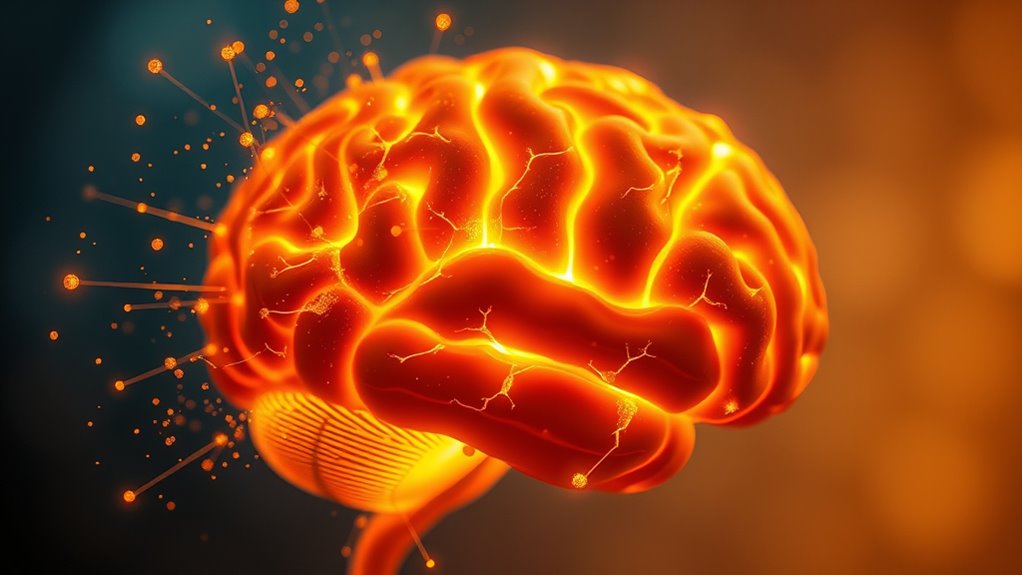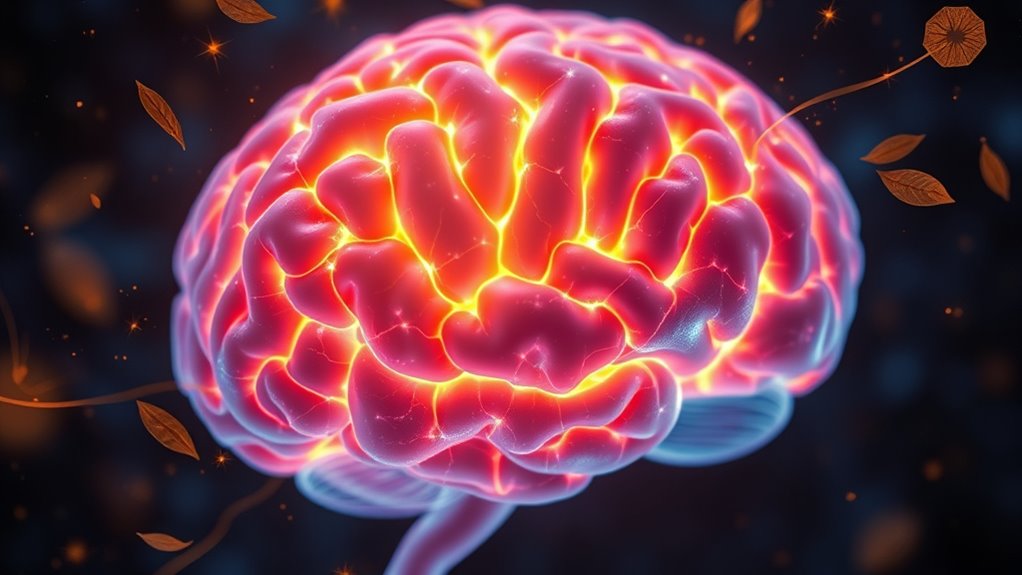Practicing gratitude rewires your brain’s chemistry by increasing the release of feel-good neurotransmitters like serotonin, dopamine, and endorphins. This boost enhances your mood, emotional resilience, and overall mental health. Regular gratitude habits reinforce positive neural pathways, helping you focus on the good around you and develop a more optimistic outlook. Over time, these biochemical shifts support quicker recovery from setbacks and greater stability during stress. Keep exploring to uncover how gratitude can transform your brain and well-being.
Key Takeaways
- Gratitude boosts serotonin, dopamine, and endorphins, improving mood and fostering a sense of well-being.
- Regular gratitude practice rewires neural pathways, emphasizing positive experiences and social bonds.
- It stabilizes emotions by reducing stress hormones like cortisol, supporting long-term mental health.
- Gratitude enhances neurotransmitter function, promoting emotional resilience and faster recovery from setbacks.
- Research confirms gratitude’s role in neurochemical balance, contributing to sustained psychological and biological well-being.

While gratitude is often seen as a simple act of courtesy, it actually holds a profound, hidden power that can transform your life. When you practice gratitude regularly, you aren’t just making others feel appreciated; you’re actively rewiring your brain chemistry. One of the key ways gratitude influences you is by promoting a healthier neurotransmitter balance. Neurotransmitters like serotonin, dopamine, and endorphins are responsible for how you feel—your mood, motivation, and overall well-being. When you focus on what you’re thankful for, your brain releases more of these feel-good chemicals, which can lift your spirits and promote a more positive outlook. Over time, this biochemical shift helps stabilize your mood, reducing feelings of anxiety and depression. Additionally, engaging in positive mental habits such as gratitude can reinforce these beneficial effects and promote long-term mental health. Moreover, practicing gratitude enhances your emotional resilience—the ability to bounce back from stress and setbacks. When faced with challenges, your brain, influenced by a grateful mindset, is better equipped to handle adversity. Gratitude fosters a sense of perspective, reminding you of what’s good in your life, even during tough times. This shift in mindset helps you interpret negative events less catastrophically and prevents your nervous system from becoming overwhelmed by stress hormones like cortisol. As a result, your brain becomes more adaptable, making you more resilient emotionally. Research supports the idea that gratitude practices can lead to measurable improvements in mental health and emotional stability. The act of expressing gratitude doesn’t just change your inner chemistry; it rewires your neural pathways. When you regularly practice gratitude, your brain begins to prioritize positive experiences and connections. This means that your brain becomes more attuned to the good things around you, reinforcing a cycle of positivity. Over time, this increased positivity strengthens your emotional resilience, making it easier to navigate life’s inevitable ups and downs. You’ll find that you recover from setbacks faster and maintain a more optimistic outlook, even in difficult circumstances. In essence, gratitude acts as a catalyst for balancing your brain’s chemistry and fortifying your emotional resilience. It’s not just about being polite or polite; it’s a powerful tool for transforming your mental health. By consciously cultivating gratitude, you prime your brain to produce more beneficial neurotransmitters and to develop a resilient, optimistic mindset. This isn’t a quick fix, but a long-term investment in your well-being that can lead to a more fulfilling, emotionally balanced life. Additionally, understanding the brain chemistry involved can help you better appreciate how these practices work on a biological level, especially in relation to neurotransmitter functions.
Frequently Asked Questions
Can Gratitude Improve Mental Health Long-Term?
Yes, gratitude can improve your mental health long-term. When you practice mindfulness and focus on what you’re grateful for, you strengthen emotional regulation. This helps you handle stress better and reduces symptoms of anxiety and depression. Regularly expressing gratitude rewires your brain to notice positive experiences more easily, creating a lasting impact on your mental well-being. Over time, these habits promote resilience and a more optimistic outlook on life.
How Does Gratitude Affect Stress Hormones?
You might think gratitude doesn’t impact stress hormones, but it actually plays a essential role through neurotransmitter modulation and hormonal regulation. When you practice gratitude, your body reduces cortisol levels, the primary stress hormone, helping you feel calmer. This positive shift supports overall health. So, by regularly expressing gratitude, you actively influence your body’s stress response, promoting better hormonal balance and reducing long-term stress effects.
Is Gratitude Beneficial for Everyone Equally?
You might wonder if gratitude benefits everyone equally. Individual differences, like personality traits, can influence how much you gain from practicing gratitude. Cultural influences also play a role, shaping how openly you express and interpret gratitude. While most people experience positive effects, some may find it more challenging or less impactful depending on these factors. Ultimately, personal context determines how deeply gratitude enhances your well-being.
Can Practicing Gratitude Reverse Brain Aging?
They say, “what’s good for the goose is good for the gander,” and practicing gratitude might just be your secret weapon against brain aging. By boosting neuroplasticity enhancement and emotional resilience, regular gratitude exercises can help slow cognitive decline. You can actively support your brain’s health, potentially reversing some age-related effects, and keep your mind sharp. So, start counting your blessings—your brain will thank you!
How Quickly Can Gratitude Change Brain Chemistry?
Gratitude can change your brain chemistry surprisingly quickly, often within days. When you practice gratitude regularly, you strengthen neural pathways associated with positive emotions and build emotional resilience. This rewiring boosts your overall mood and reduces stress. As a result, your brain responds more favorably to challenges, enhancing your emotional resilience. So, the more consistently you practice gratitude, the faster you’ll notice these beneficial changes in your brain.
Conclusion
When you embrace gratitude, you open a secret garden within your mind, where positivity blooms and stress withers away. Each thankful thought acts like sunlight, nourishing your brain’s happiness pathways. As you cultivate this habit, you’re rewiring your chemistry, turning everyday moments into treasures. So, choose gratitude daily—your brain will thank you by shining brighter, transforming your life into a vibrant tapestry woven with joy and resilience.









